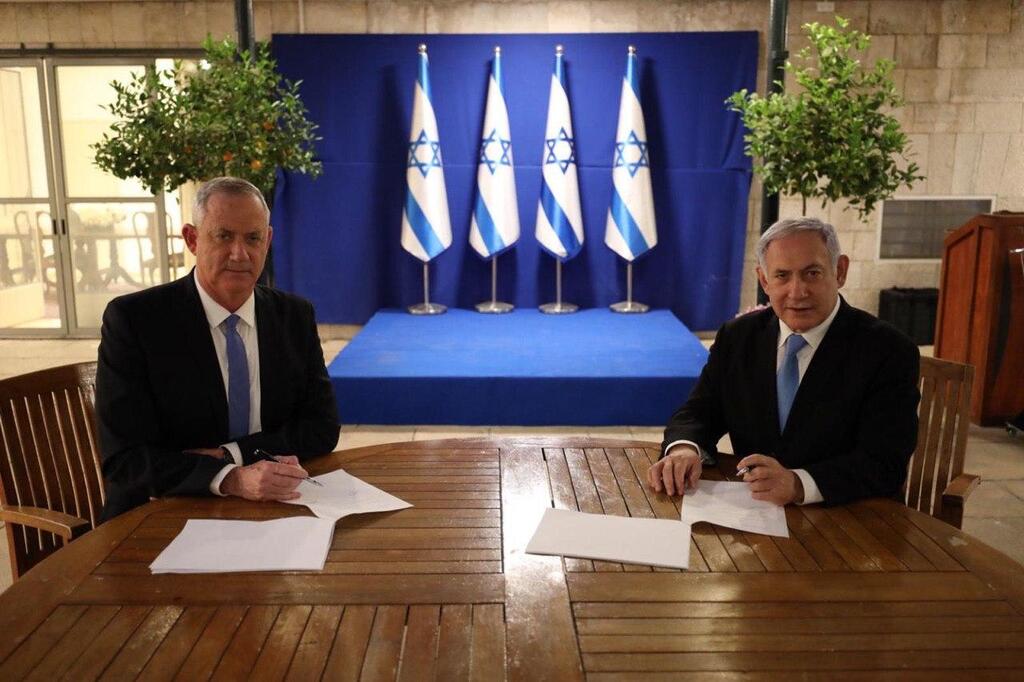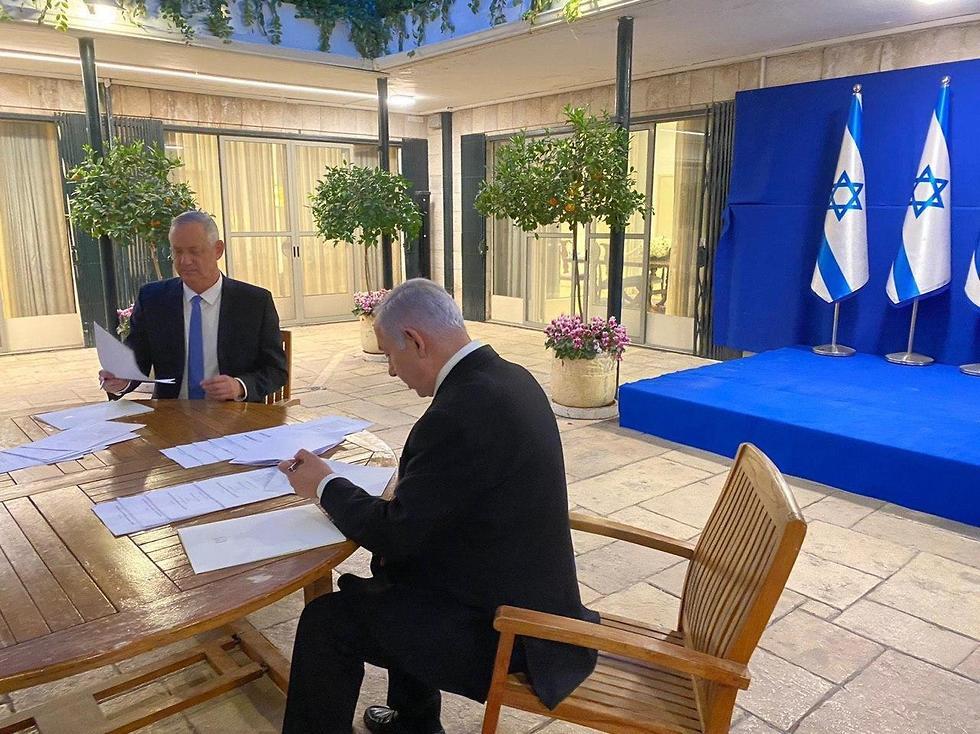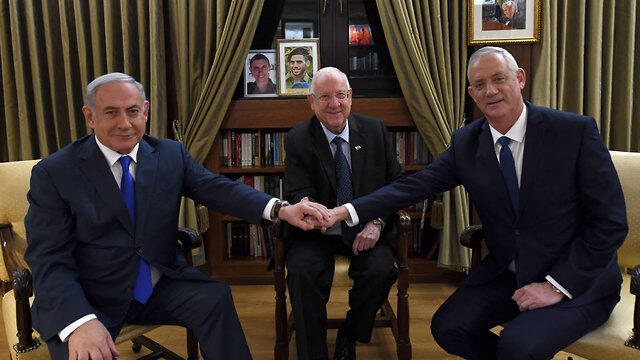Prime Minister Benjamin Netanyahu and his chief rival Benny Gantz said on Monday that they have forged a deal to form an "emergency" unity government.
The deal between Netanyahu's ruling Likud Party and Gantz' Blue and White ends months of political paralysis and averts what would have been a fourth consecutive election since April 2019.
5 View gallery


Blue & White leader Benny Gantz and Prime Minister Benjamin Netanyahu sign unity deal
Under the agreement, the two party leaders will rotate the prime minister's post for the three-year term of the government, with Netanyahu remaining in office for the first year and a half.
Former IDF chief Gantz will serve in the interim as defense minister and as locum prime minister should the need arise.
The government is expected to include 32 ministers and more than a dozen deputy ministers, making it the largest in Israel's history.
Blue and White will receive 16 ministries, including defense, foreign affairs for half of the term; justice, immigration and absorption, culture and sports, economics and welfare (which have been earmarked for Labor's Amir Peretz and Itzik Shmuli), communications, agriculture, strategic issues, tourism, social equality, and diaspora affairs.
Gantz's political partner Gabi Ashkenazi will serve as foreign minister during the first 18 months.
Likud will receive the foreign affairs portfolio for half of the term, public security, transportation, housing, education, environmental protection, energy, Jerusalem affairs, and other less key posts.
The agreement also gives Netanyahu veto power over the appointment of the attorney general and state prosecutor - the two senior officials who oversaw the prime minister's indictment for bribery, fraud and breach of trust.
During the period of an "emergency government," which is set to last six months, there will be no appointments requiring government approval. This means that acting state prosecutor Dan Eldad, who was appointed by the justice minister and Netanyahu ally Amir Ohana, will remain in post.
5 View gallery


Blue & White leader Benny Gantz and Prime Minister Benjamin Netanyahu sign unity deal
The two sides also decided that if the High Court of Justice rules before the new government is sworn in that Netanyahu cannot form a coalition due to the indictments against him, the agreement becomes void and the Knesset will dissolve.
The committee for judicial nominations will include two MKs from Likud as well as Derekh Eretz MK Zvi Hauser as "the representative from the opposition."
Gantz on the campaign trail promised not to sit in a government led by a prime minister facing criminal charges, but he recently backtracked, saying the enormity of the coronavirus crisis necessitated an emergency unity government.
"We have prevented a fourth election. We will protect democracy. We will fight coronavirus and care for all of Israel's citizens," Gantz said on Twitter after signing the deal.
Netanyahu tweeted a picture of Israel's blue and white flag, followed by a statement that read: "I promised the State of Israel a national emergency government that will work to save the lives and livelihoods of the citizens of Israel."
The deal states that Likud will take over the leadership of the Knesset's coronavirus committee.
After the deal was signed, Netanyahu called Education Minister Rafi Peretz and Defense Minister Naftali Bennett to inform them that an agreement had been reached. Netanyahu is expected to offer Bennett's Yamina party two ministerial posts although it had been angling for three.
Yamina said in response that, "Netanyahu has shown us the door."
5 View gallery


Benjamin Netanyahu, Reuven Rivlin and Benny Gantz meeting last month for unity talks
(Photo: GPO)
The unity agreement includes a clause that states that Israel will assume sovereignty over the West Bank on July 1, a move that has drawn massive international criticism when it was announced as part of U.S. President Donald Trump's plan for Middle East peace.
Blue & White said: "The Trump plan will be moved forward responsibly, with protection of the strategic assets of the State of Israel and of regional stability."
'Slap in the face of Israeli majority'
Joint List leader Ayman Odeh slammed the agreement, calling it a "slap in the face" for the majority of Israelis.
"Gantz and Netanyahu's government of surrender is a slap in the face of the civilian majority who goes to the polls time and time again to oust Netanyahu," said Odeh, who backed Gantz to form the government in the wake of the March 2 elections.
"Gantz was not courageous enough to triumph and chose to legitimize annexation, racism, and corruption," Odeh said.
5 View gallery


Ayman Odeh recommended to President Reuven Rivlin that Benny Gantz should form the next government following the March 2 elections
(Photo: GPO)
The announcement also drew fire from Yisrael Beytenu leader Avigdor Liberman, who has long been a backer of a unity government to end the political stalemate.
He dismissed it as "another government of [Prime Minister Benjamin] Netanyahu and his religious-messianic bloc."
"I welcome the establishment of the government, although it is not a unity government," Liberman said.
"This is another government of Netanyahu and the Haredi-messianic bloc with a fig leaf from two senior [IDF officers]," he said, referring to Gantz and Ashkenazi, both former army chiefs.
Liberman added that his party would be part of the "substantive opposition."


